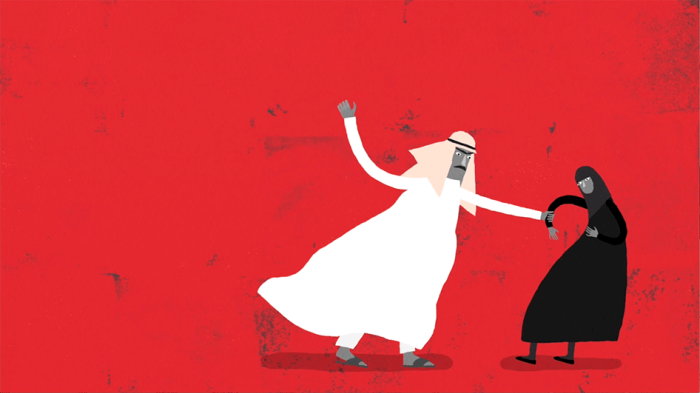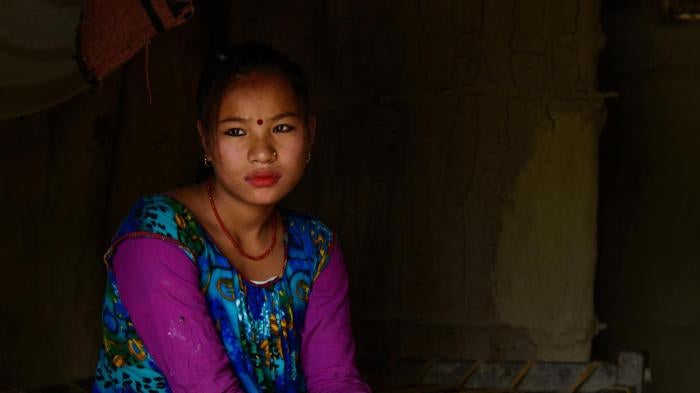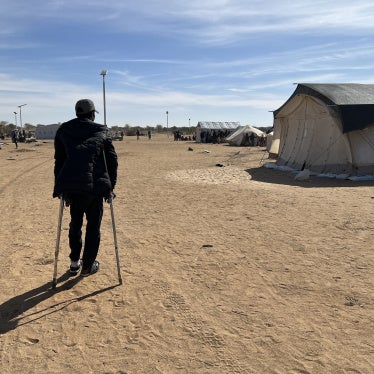The gunning down of peaceful protesters in Ethiopia. Animations depicting the devastation of Saudi Arabia’s male ‘guardianship’ system on women’s lives. From these to child brides and LGBT rights, here are the year’s most-watched videos from Human Rights Watch on YouTube and Facebook.
1. When we pieced together cell phone footage showing the deaths of peaceful protesters in Ethiopia, it became by far our most-watched video this year – both in English and Amharic.

2. Under Saudi Arabia’s guardianship system, women need a male guardian’s permission to marry, go to school, work, or even undergo certain medical procedures. This holds true even if a guardian – a father, husband, or even son – is abusive.

Read a text description of this video
Shelter
Sound bite:
Look, the best thing you can do is to reconcile with your husband.
Pledge Not to Assault My Wife
Text on screen:
Does it make sense to allow an abusive husband to act as guardian over his wife?
Text on screen:
We Stand Together to End Male Guardianship of Women
3. People who don’t conform to traditional ideas of gender in Sri Lanka face discrimination and abuse.

4. Thirty-seven percent of girls in Nepal marry before age 18, and 10 percent are married by age 15.

Read a text description of this video
OPENING:
[FOOTAGE GIRLS IN THE PARK]
TESTIMONY SHARMILA G.:
I used to imagine that life would just go by laughing and playing.
But now, there’s no laughter.
TITLE:
OUR TIME TO SING & PLAY
Child Marriage in Nepal
TESTIMONY SHARMILA G.:
I’m 14 years old.
I’ve been married for a year and a half.
When I see my friends going to school, I wish I could go with them.
And I wonder why I got married so soon.
TEXT ON SCREEN (TOS):
Married at 12
Married at 16
Married at 15
Married at 14
Married at 15
Married at 12
Married at 15
VOICEOVER
Nepal has the third highest rate of child marriage in Asia. 37 percent of girls marry before they’re 18, and 10 percent before 15, despite the fact that the legal age of marriage is 20.
Why are so many girls married?
LOWER THIRD:
SUMNIMA TULADHAR
Executive Coordinator
Child Workers in Nepal
TESTIMONY SUMNIMA:
The society is structured in a way that gives women status of second-class citizen in most of the South Asian countries. They are viewed as economically inactive citizens. Families are happy to marry them off because what will they bring?
LOWER THIRD:
VOICE OF MANJUSHREE THAPA
Writer & Activist
VOICEOVER
Girls are often seen as a “burden.” Families, struggling to get by, send girls to work. And then they unload them through marriage.
(TOS):
CHILD LABOR
LOWER THIRD:
CHILD WORKER
9 years old
TESTIMONY SELINA T.:
I help my mom with her work.
I put the bricks in a heap.
I make tea and shape the bricks.
VOICEOVER
Child labor is common in Nepal, with about 40% of children working. Girls are more likely to work than boys (TOS 48% VS. 36%) and most of the children in hazardous work are girls.
TOS [60%]
LOWER THIRD:
CHILD BRIDE
Married at 14
TESTIMONY ANJANA M.:
I wanted to study, but my parents didn’t let me go to school.
They just sent me away from them.
Men came to take me [to work as a maid] but I cried and said, “I don’t want to go, I want to stay home.”
But my father had already taken 3000 rupees [28 USD] for me, so I had to go.
VOICEOVER
Girls who work often have to leave school. And once they leave school, they’re more likely to get married.
TOS: BARRIERS TO EDUCATION
VOICEOVER
What keeps girls out of school? Child labor, domestic burdens, boys being prioritized over girls, and poverty.
TOS:
CHILD LABOR
DOMESTIC BURDENS
BOYS PRIORITIZED OVER GIRLS
POVERTY
LOWER THIRD:
CHILD BRIDE
Married at 15
TESTIMONY KALPANA T.:
I lived with [and was raised by] my grandparents. I used to study but we had [financial] problems.
So I had to get married.
Even if the education is free, we have to buy books, pencils, uniforms.
Of course it was costly
so we couldn’t afford it.
I thought if I got married, it would help my grandparents a little.
After I left home, there would be a little more [for them] to eat.
VOICEOVER
Rumors and gossip can have life altering consequences.
TOS: SOCIAL PRESSURE
TESTIMONY ANJANA M.:
I didn’t care much for boys. I didn’t even want to get married.
Then girls from the village started teasing me [suggesting I was in a relationship with a man in the village].
So I started to cry.
There were too many rumors, so I told him I would marry him.
I didn’t have any options.
VOICEOVER
With a dearth of options, children are choosing to get married on their own, some as young as 12 or 13. In Nepal, these unions are called love marriages and they’re on the rise. Often, they’re born of desperation – children are looking for a way out of abuse or poverty at home, hard labor, or an arranged marriage.
LOWER THIRD:
CHILD BRIDE
Married at 14
TESTIMONY TILMAYA M.:
[My parents] told me not to marry him. They told me to marry somebody else from another village.
They berated me.
That’s why we eloped.
VOICEOVER
Whether it’s a forced child marriage or a love marriage, the damage to the lives of girls and their families is often the same.
LOWER THIRD:
CHILD BRIDE
Married at 12
TESTIMONY SHARMILA G.:
I’m pregnant now.
Seven months.
I’m still a child and I’m pregnant so I feel strange.
I didn’t know anything about babies, how they’re conceived, I had no idea.
LOWER THIRD:
CHILD BRIDE
Married at 12
TESTIMONY LALITA B.:
I had three children but two of them died. This is the third one.
[The doctor] told me it was because I was too young, my body couldn’t handle pregnancy.
They said, “Your uterus is small.”
I don’t want what happened to me to happen to [my daughter].
My life is destroyed. I hope it will turn out differently for her.
TESTIMONY KALPANA T.:
When I see my friends going to school,
I wish I could go to school too,
to study more, to stand on my own feet,
to do something [with my life].
VOICEOVER
Education and empowerment shouldn’t be a distant dream for girls in Nepal.
LOWER THIRD:
YASODHA MAJHI
Student
19 years old
TESTIMONY YASODHA:
People think that girls can’t do anything.
But once we’re educated we’d be equal to [boys].
They wouldn’t be able to oppress us for being girls and say that we’re not equal to them.
LOWER THIRD:
MOHNA ANSARI
National Human Rights Commission
TESTIMONY MOHNA:
Nepal has the best law [on child marriage] in South Asia,
but now is the time to look at how well it’s being enforced.
We must enforce it.
VOICEOVER
Nepal’s government promises reforms, but in towns and villages across the country, change is coming far too slowly. The government needs to come up with a real plan, and quickly, before more children see their futures stolen from them by child marriage.
5. In Saudi Arabia, the permission of male guardians is required for women to be released from prison.

Read a text description of this video
Female Juvenile Detention Center
Calendar
Sound bite:
She brought shame upon us. There is no way I can let her come home.
Text on screen:
Does it make sense to require a male guardian’s permission for a woman to be released from prison?
Text on screen:
We Stand Together to End Male Guardianship of Women
6. … and to travel.

Read a text description of this video
Phone texts:
Invitation to speak at a cardiac surgery conference in London.
Son, please grant me permission to travel.
Please grant me permission to travel.
I don’t feel like it.
I’m busy.
Text on screen:
Does it make sense to require a woman to obtain permission from a male guardian so she can travel?
Text on screen:
We Stand Together to End Male Guardianship of Women
7. How LGBT students are bullied in Japan…

8. A victim shares how he escaped Boko Haram, and talks of those who couldn’t…

9. This man tells how he was tortured in a CIA-run detention center.

10. And at number 10, how tobacco companies make money off the backs -- and health -- of Indonesian child workers.










